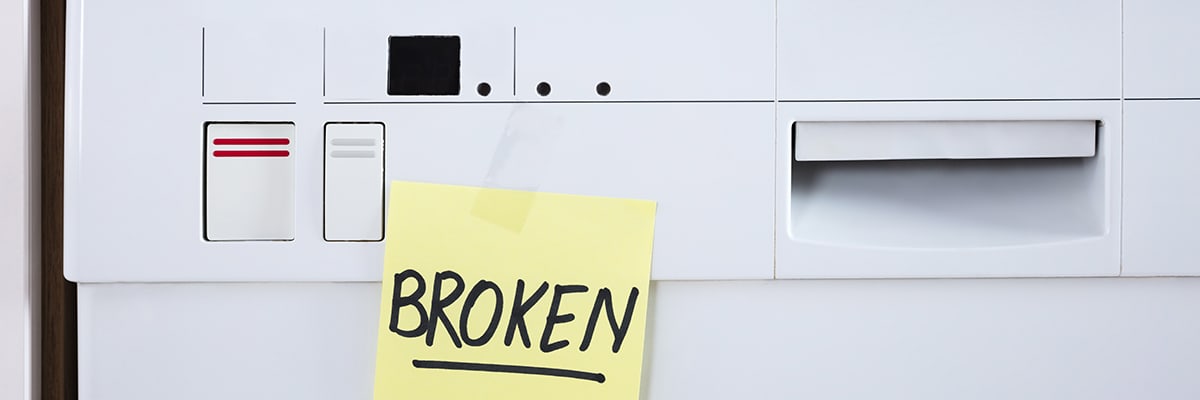
Return navigate_next
Dishwasher Not Working? Here Are Your Next Steps
September 17, 2021 *
Dishwashers have become an essential appliance in many modern homes. As a result, about 68% of American homes have a kitchen dishwasher. Oddly, of those dishwasher owners, it seems that only about 50% of them use this appliance. However, those who do use them appreciate the time and personal energy they use.
If you are someone who owns, uses, and loves your dishwasher, you probably dread the day your dishwasher stops working. However, suppose your dishwasher is currently broken or experiencing issues that keep it from working. In that case, you might wonder what you can do before reaching out to your extended appliance warranty provider.
What Steps Should You Take If Your Dishwasher Stops Working?
One of the worst things that can happen is for your dishwasher to break or stop working. It’s tough to go back to hand dishwashing, so most people feel your pain. Even if you have a trusty warranty, you might want to see if you can do anything to get things back in gear and work on your own. The best part is that some issues don’t require much work on your part at all.

Let’s explore and assess some common symptoms of dishwasher problems and what steps you need to take to get yours back up and running and washing your dishes.
Your Dishwasher Is Making Strange Noises
If you have owned a dishwasher for a while, you probably know that there are multiple sounds you might hear throughout a cycle. And some cycles are noisier than others. Normal sounds that you might hear when running your dishwasher include:
- The hiss of water running through the inlet fill valve at high speeds
- The pump motor’s humming, whirring, and sloshing of water
While these sounds are noticeable, they aren’t especially loud. Once you get to know them, they become ambient background noise that doesn’t cause concern.
Some sounds to investigate further include:
- A grinding noise might indicate something is stuck in the chopper blade area, indicating that you might carefully explore the blades to see if something is there.
- A thumping sound might be the drain line bumping into and vibrating against the dishwasher’s internal cabinet or that the cabinet isn’t fastened securely to the floor.
- A buzzing, squealing, or whining noise might come from the drain or wash pump, which might indicate that the bearings have gone bad.
Your Dishes and Glasses Come Out Cloudy or Spotty
It’s frustrating to unload a dishwasher and see plates and glasses covered in spots that you need to touch up with a kitchen towel. Fortunately, this probably isn’t an intensely problematic mechanical issue. Instead, it probably has more to do with having hard water.

The first and the best thing you can do is add a rinse aid agent to the rinse aid compartment inside your machine. Rinse aid is a surfactant, a chemical solution that reduces the surface tension of the liquid in which the rinse agent is dissolved. Essentially, it makes the water “wetter,” allowing it to disperse or spread out. Ultimately, it makes it less likely for droplets on dishes to turn into water spots.
Your Dishwasher Will Not Drain
This issue is more serious since a dishwasher full of water might lock your dishes inside due to a lack of drainage. Further, it might cause flooding in your kitchen and any adjacent rooms. If you’re comfortable taking on this task, investigate the check valve assembly in the drain sump to see if it is moving properly.
If you can’t find a solution, it’s time to check in with your appliance technician or, better yet, your warranty provider to schedule a tech appointment or find out the next best step. Again, it’s a job intended for someone comfortable with the inner workings of a dishwasher since the repair requires updating the drain pump or motor and ensuring there aren’t any drain flapper or solenoid obstructions.
Your Dishwasher Will Not Latch
Although the latching mechanism is the outermost part of your dishwasher, it’s important to ensure everything is inside securely. Check the latch to see if there is excessive wear. There might also be an issue with the electronic control. In either case, you might need to repair the latch or hinge catch to get it back into working order.

Your Dishwasher Is Leaking
This issue is the big one no one wants to experience since it indicates an issue with the machine and can cause extensive damage to your home, especially if no one is there to stop it or tend to it if something goes wrong. Here are a few things to check right away:
- Drainage hose for damage such as cracks
- Gaskets in the heating element
- The pump or pump seal
- Door gasket
Contact Upsie to Protect Your Dishwasher
Upsie is the best option to protect your dishwasher. You can purchase an Upsie warranty for any dishwashers bought within the last 11 months. In addition, Upsie warranties cost up to 70 percent less than warranties offered by competitors. When you have an Upsie appliance warranty, you can always reach out for help.
Customers with Upsie warranties can contact the claims service department 24/7 to get help with their dishwasher. Contact the Upsie team to learn about keeping your dishwater running efficiently and effectively.
Learn More About Appliances:
* This article is over 6 months old and may or may not be updated.
